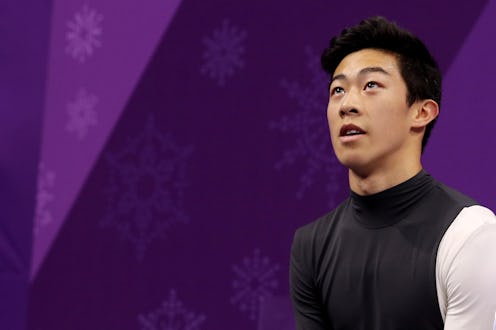Entertainment
All The Details You Need To Know About Nathan Chen's Ice Skating Song At The Olympics

Nathan Chen began the 2018 Olympics with the eyes of the nation upon him, and that's where they have stayed. Whether he's up or he's down, audiences couldn't be more interested in the 18-year-old, and Chen's Olympic ice skating routing song is already much-discussed. He performed on Saturday morning in PyeongChang, which because of the time difference translated to Friday evening in the United States on NBC. And thanks to the internet, you can rewatch the moment again and again. (On top of that, NBCSN is covering ice skating at 7 p.m. EST on Saturday.)
According to a Feb. 15 report in the New York Times, Chen's four-minute-plus free skate program is backed by music from the 2009 film Mao's Last Dancer. According to IMDb, that score was composed by Christopher Gordon, and includes excerpts from 20th century classical composer Stravinsky's "Rites of Spring." That makes it a more traditional choice than Chen's short program song "Nemesis," in more ways than one. The talented skater has much to draw from when it comes to Mao's Last Dancer.
The film is based on the autobiography of Li Cunxin, who was born into poverty under the Communist regime, in a commune near the city of Qingdao, in east China. As the film reportedly portrays, at age 11, he was selected by Mao Zedong's fourth wife, Jiang Qing, to begin an education in ballet in Beijing to serve the Party. It was a journey which ultimately led him to America, defection, two marriages, and a long career in ballet with both the Houston Ballet and the Australian Ballet.
It's an incredible story, and it's easy to see why it might stand out to Chen. Like Li, the young Olympian also has a connection to China; his parents Zhidong Chen and Hetty Wang spent their young adulthoods in Tianjin, China, before immigrating to the U.S. in their 20s, according to Chen's conversation with NBC in advance of the 2018 Games. And while Chen's parents' experience didn't include defection, that didn't necessarily make the transition any easier. As Chen told Times for their piece published Thursday:
“They tend not to talk too much about their struggles, but it must have been so difficult, coming to a new country, not speaking the language, not having much money, not having any friends. It’s amazing how they were able to fight through that.”
But the similarities don't stop there. Like the memoirist, Chen has also trained in dance, as he shared earlier this month in a media teleconference. The Salt Lake City-native apparently took six years of classes with a company called Ballet West, where Dance Magazine reported he was training up to six days a week by the time he was just 8 years old.
But even with all the connections, Chen told the Times that he was hesitant to skate to a program so closely connected to the work of a Chinese defector. "I thought it was a little too political," he said of his first reaction to the work. But Canadian Lori Nichol, who has previously worked with champions like Michelle Kwan and Evan Lysacek and ultimately choreographed this piece, persisted. According to the Times piece, she put Chen and Li on the phone with each other, and that was the deciding factor. "You have devastating defeat and you learn from that,” Li said he told the younger man, "and it is going to make your success that much more rewarding.”
Although their ultimate career paths have been different, Chen and Li share an understanding of the extreme sacrifice that it takes to perform on a world-class level. Li faced obstacles like the Communist regime and the threat of deportation, which the younger man has thankfully never had to grapple with, as an American citizen. But Chen has had to come back from a series of crippling injuries caused by the feats he's asking his growing body to accomplish. As recently as 2016, he aggravated an old hip injury that sent him to surgery, and kept him off the ice for months, according to the site Ice Network.
More recently, at these very Olympics, he's struggled on the ice. His short program was filled with errors that dropped the previously-undefeated skater and gold medal favorite into 17th place. Performing a piece with such emotional resonance likely helped give Chen the boost he needed to re-center himself and bear up under the pressure.